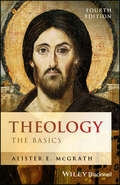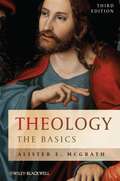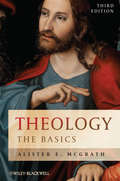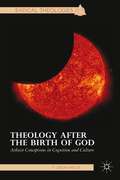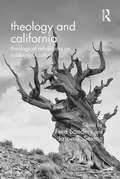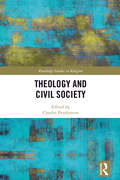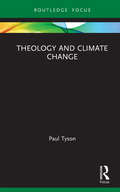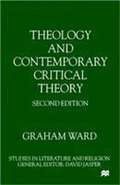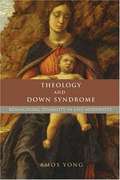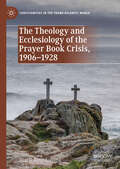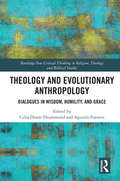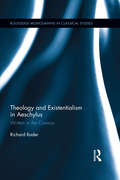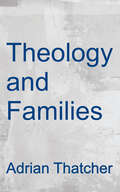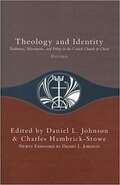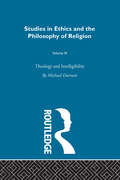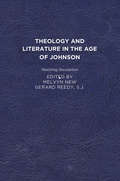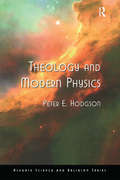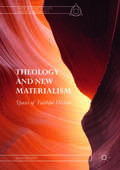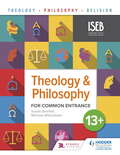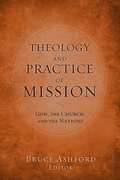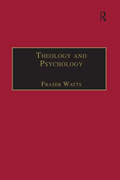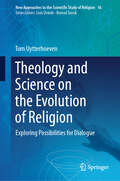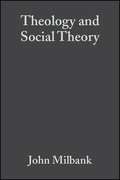- Table View
- List View
Theology: The Basics (Coursesmart Ser.)
by Alister E. McGrathThis fourth edition of the international bestseller is the ideal introduction for those who are new to Christian theology. In this revised and expanded edition, the author introduces readers to the central ideas and beliefs, the key debates and the leading thinkers of Christianity. Throughout, the aim is to bring clarity and brevity to the central ideas of theology, both traditional and contemporary. The text comprehensively covers the individual doctrines that form the Christian belief system, weaving together these doctrines, their history, and the intellectual nuance behind them into an inter-connected web. All major Christian denominations are explored, as are their differences and shared customs and beliefs. This rich tapestry results in a clear view of Christianity, providing a coherent vision of the religion in its main forms.
Theology: The Basics (3rd Edition)
by Alister E. McgrathCompletely updated and expanded, this third edition from one of the world's leading theologians introduces students to key theological issues, contextualizing them within the bible and the works of seminal theologians. Introduces readers to key theological issues such as God, Jesus, the Holy Spirit, faith, creation, salvation, atonement, religious history, and heaven Thoroughly updated, with the addition of a new chapter on the Holy Spirit Now includes images and more pedagogical features to engage the reader Each chapter offers an overview of an important theme, presents relevant biblical passages, and summarizes the contribution of a major theologian Expands the range of theological positions discussed within the book, especially those of contemporary and feminist theologians Maintains the user-friendly structure of the previous edition, with the Apostle's Creed as a framework Concludes with suggestions on how readers can take their study further Can be used alongside the new edition of Theology: The Basic Readings for a complete overview of the field
Theology: The Basic Readings Third Edition
by Alister E. McgrathThe second edition of this book, written by internationally-acclaimed theologian and author Alister E. McGrath, has been completely updated in response to feedback from readers. It retains the clarity and accessibility that made the first edition so popular, whilst expanding its coverage of a range of issues.Includes a major new chapter on sacraments and new sections on core topics, including the problem of suffering, the theology of sin, concepts of heaven, and views of the millennium. Uses the Apostle's Creed as a framework to introduce readers to key theological issues, such as God, Jesus Christ, the Holy Spirit, faith, creation, salvation, atonement, religious history and heaven. Contains within each chapter an overview of one of these themes, presents relevant biblical passages, and summarizes the contribution of one major theologian. Written by one of the world's leading theologians for anyone taking a first short course in Christian theology. Can be used alongside McGrath's Theology: The Basic Readings for a complete overview of the field.
Theology after the Birth of God
by F. Leron ShultsEngaging recent developments within the bio-cultural study of religion, Shults unveils the evolved cognitive and coalitional mechanisms by which god-conceptions are engendered in minds and nurtured in societies. He discovers and attempts to liberate a radically atheist trajectory that has long been suppressed within the discipline of theology.
Theology and California: Theological Refractions on California’s Culture
by Jason S. Sexton Fred SandersExploring California as a theological place, this book renders critical engagement with significant Californian religious and theological phenomena and the inherent theological impulses within major Californian cultural icons. Harnessing conceptual tools inherent to theology, through theological reflection, assessment, and critique, the chapters in this volume begin to ascertain the significance of various empirical data and that no other qualitative methodological Californian study has done. Many universities are picking up on California literature as a theme that highlights a place of hope, wonder, and cultural innovation, but have neglected the significance of theological instincts flowing through the Californian dynamic. Californians Fred Sanders and Jason Sexton assemble leading voices and specialists both from within and without California for engagement with California’s influential culture: including leading theologians and cultural critics such as Richard J. Mouw, Paul Louis Metzger, and Fred Sanders, alongside leading specialists in Film studies and cultural critique, theological anthropology, missiology, sociology, and history.
Theology and Civil Society (Routledge Studies in Religion)
by Charles PembertonFrom food banks to migrant welcome committees, and community organisers to internet based campaigners, civil society is central to the North Atlantic social landscape. Theology and Civil Society advances our understanding of what civil society is and offers a theologically informed re-imagining of our shared social life. Prefaced by a foreword by the Rev. Dr Rowan Williams, this book explores contemporary manifestations of the kind of collective action observed in civil society since the 1800s. It then examines civil society as the sum of modern associations which mediate our relationships to the market and the state, but which cannot be identified fully with either the market or the state. Finally, three different perspectives on civil society are presented using insights from theologians such as John Milbank and Georg Hegel. This is a pertinent topic for contemporary society, and it is explored expertly here by an international panel of contributors. As such, it is an important volume for any scholar of Theology and Religious Studies and their interactions with Sociology and Politics.
Theology and Climate Change (Routledge Focus on Religion)
by Paul TysonTheology and Climate Change examines Progressive Dominion Theology (PDT) as a primary cultural driver of anthropogenic climate change. PDT is a distinctive and Western form of Christian theology out of which the modern scientific revolution and technological modernity arises. Basic attitudes to nature, to instrumental power over nature, and to an understanding of humanity’s relationship with nature are a function of the deep theological preconditions of Western modernity. Much of what we like about Western modernity is indebted to PDT at the same time that this tacit cultural theology is propelling us towards climate disaster. This text argues that the urgent need to change the fundamental operational assumptions of our way of life is now very hard for us to do, because secular modernity is now largely unaware of its tacit theological commitments. Modern consumer society, including the global economy that supports this way of life, could not have the operational signatures it currently has without its distinctive theological origin and its ongoing submerged theological assumptions. Some forms of Christian theology are now acutely aware of this dynamic and are determined to change the modern life-world, from first assumptions up, in order to avert climate disaster. At the same time that other forms of Christian theology – aligned with pragmatic fossil fuel interests – advance climate change skepticism and overtly uphold PDT. Theology is, in fact, crucially integral with the politics of climate change, but this is not often understood in anything more than simplistic and polemically expedient ways in environmental and policy contexts. This text aims to dis-imbed climate change politics from polarized and unfruitful slinging-matches between conservatives and progressives of all or no religious commitments. This fascinating volume is a must read for those with an interest in environmental policy concerns and in culturally embedded first-order belief commitments.
Theology and Contemporary Critical Theory (2nd edition)
by Graham WardWard (theology and literary theory, Cambridge U.) explores how the critical theory of such postmodern thinkers as Foucault, and Derrida has changed the context of the academic study of theology and challenges it and demands its transformation. He discusses theology in relation to representation, history, ethics, aesthetics. He also suggests some directions for the discipline during post-modernity.
Theology And Down Syndrome: Reimagining Disability In Late Modernity
by Amos YongWhile the struggle for disability rights has transformed secular ethics and public policy, traditional Christian teaching has been slow to account for disability in its theological imagination. Amos Yong crafts both a theology of disability and a theology informed by disability. The result is a Christian theology that not only connects with our present social, medical, and scientific understanding of disability but also one that empowers a set of best practices appropriate to our late modern context.
The Theology and Ecclesiology of the Prayer Book Crisis, 1906–1928 (Christianities in the Trans-Atlantic World)
by Dan D. CruickshankThis book considers the doctrinal and ecclesiological trends that were present during the construction of the revised Book of Common Prayer of 1927. Through the use of the records of both Convocations and of the National/Church Assembly, it examines the debates that led to the revised Book and the doctrinal shifts that were present in these debates. It challenges the idea that the revision process stalled in the First World War by showing how the birth of the National Assembly that took place during the war was born out of the revision process. Through the Assembly records it shows the integral role the laity played in the revision process. It examines the attempts to get the revised Books through Parliament, the difference between pro and anti-revision speakers, and the radical ecclesiological thinking that followed the rejections.
Theology and Evolutionary Anthropology: Dialogues in Wisdom, Humility and Grace (Routledge New Critical Thinking in Religion, Theology and Biblical Studies)
by Celia Deane-Drummond Agustín FuentesThis book sets out some of the latest scientific findings around the evolutionary development of religion and faith and then explores their theological implications. This unique combination of perspectives raises fascinating questions about the characteristics that are considered integral for a flourishing social and religious life and allows us to start to ask where in the evolutionary record they first show up in a distinctly human manner. The book builds a case for connecting theology and evolutionary anthropology using both historical and contemporary sources of knowledge to try and understand the origins of wisdom, humility, and grace in ‘deep time’. In the section on wisdom, the book examines the origins of complex decision-making in humans through the archaeological record, recent discoveries in evolutionary anthropology, and the philosophical richness of semiotics. The book then moves to an exploration of the origin of characteristics integral to the social life of small-scale communities, which then points in an indirect way to the disposition of humility. Finally, it investigates the theological dimensions of grace and considers how artefacts left behind in the material record by our human ancestors, and the perspective they reflect, might inform contemporary concepts of grace. This is a cutting-edge volume that refuses to commit the errors of either too easy a synthesis or too facile a separation between science and religion. As such, it will be of interest to scholars of religious studies and theology – especially those who interact with scientific fields – as well as academics working in anthropology of religion.
Theology and Existentialism in Aeschylus: Written in the Cosmos (Routledge Monographs in Classical Studies)
by Richard RaderTheology and Existentialism in Aeschylus revivifies the complex question of fate and freedom in the tragedies of the famous Greek playwright. Starting with Sartre’s insights about radical existential freedom, this book shows that Aeschylus is concerned with the ethical ramifications of surrendering our lives to fatalism (gods, curses, inherited guilt) and thoroughly interrogates the plays for their complex insights into theology and human motivation. But can we reconcile the radical freedom of existentialism and the seemingly fatal world of tragedy, where gods and curses and necessities wreak havoc on individual autonomy? If forces beyond our control or comprehension are influencing our lives, what happens to choice? How are we to conceive of ethics in a world studiously indifferent to our choices? In this book, author Ric Rader demonstrates that few understood the importance of these questions better than the tragedians, whose literature dealt with a central theological concern: What is a god? And how does god affect, impinge upon, or even enable human freedom? Perhaps more importantly: If god is dead, is everything possible, or nothing? Tragedy holds the preeminent position with regard to these questions, and Aeschylus, our earliest surviving tragedian, is the best witness to these complex theological issues.
Theology and Families
by Adrian ThatcherThis timely book, by one of the world’s leading theologians in this field, makes a positive theological contribution to present intellectual and practical discussions about families and children. Explores the intellectual and practical debates about the changing nature of family forms, roles and relationships, and how Christian faith and theology can contribute to the thriving of families and children. Considers the causes and consequences of changes to families over recent decades. Utilizes the theological resources that are best equipped to deal with these changes and to shape ethical teaching, ethical practice, moral judgements, and public policies. Develops family-friendly readings of scripture, tradition and doctrine, and moves forward theological treatment of marriage, gender and children.
Theology and Identity: Traditions, Movements, and Polity in the United Church of Christ
by Daniel L Johnson Charles Hambrick-StoweThis collection of essays spans the breadth of the United Church of Christ: its roots; its polity, ministry, and worship issues; and its theological issues and movements. The revised and updated edition includes a new preface; a new chapter title for Chapter 18 The United Church of Christ Tomorrow: A View from 1990; and the addition of a new chapter, Chapter 19: Into a New Century.
Theology and Intelligibility: Volume III (Studies In Ethics And The Philosophy Of Religion)
by Michael DurrantThis is Volume III out of nine in a collection of Studies in Ethics and the Philosophy of Religion which is meant to provide an opportunity for philosophical discussions of a limited length which pursue in some detail specific topics in ethics or the philosophy of religion, or topics which belong to both fields. Originally published in 1973, this text looks at Theology and Intelligibility and discusses a proposition from natural theology; and also a formula which in the context of sacred doctrine is the doctrine of the Holy Trinity.
Theology and Literature in the Age of Johnson: Resisting Secularism
by Melvyn New Donald R. Wehrs John A. Dussinger Regina Janes E. Derek Taylor Robert G. Walker Patrick Müller Steven Scherwatzky Katherine Kickel Nicholas Seager Geoff Newton Ryan J. Stark Brett C. McInelly Paul Tankard Deborah Heller Frans De Bruyn Roger D. Lund Nathalie ZimpferTheology and Literature in the Age of Johnson: Resisting Secularism contains seventeen essays exploring the complex relationships between literary intentions and theological concerns of authors writing in the second half of the eighteenth century. The diversity of literary forms and subjects, from Fielding and Richardson to Burke and Wollstonecraft, is matched by a diversity of approaches and theologies. To argue that the age “resisted secularism” is by no means to argue that resistance was blindly doctrinal or rigidly uniform. The many ways secularism could be resisted is the subject of the collection. Published by University of Delaware Press. Distributed worldwide by Rutgers University Press.
Theology and Marxism in Eagleton and Žižek: A Conspiracy of Hope
by Ola SigurdsonTaking its cue from the renewed interest in theology among Marxist and politically radical philosophers or thinkers, this study inquires into the reasons for this interest in theology focusing on the British literary theorist Terry Eagleton and the Slovenian philosopher and psychoanalyst Slavoj Žižek, as two contemporary prominent Marxist thinkers.
Theology and Modern Physics (Routledge Science and Religion Series)
by Peter E. HodgsonThe new discoveries in physics during the twentieth century have stimulated intense debate about their relevance to age-old theological questions. Views range from those holding that modern physics provides a surer road to God than traditional religions, to those who say that physics and theology are incommensurable and so do not relate. At the very least, physics has stimulated renewed theological discussions. In this critical introduction to the science-theology debate, Peter E. Hodgson draws on his experience as a physicist to present the results of modern physics and the theological implications. Written for those with little or no scientific background, Hodgson describes connections between physics, philosophy and theology and then explains Newtonian physics and Victorian physics, the theories of relativity, astronomy and quantum mechanics, and distinguishes the actual results of modern physics from speculations. The connections with theology are explored throughout. The concluding section draws discussions together and makes an important new contribution to the debate.
Theology and New Materialism
by John ReaderThis book argues that identified weaknesses in recent theological engagement with New Materialism can be successfully addressed by incorporating insights from Relational Christian Realism. Central themes are those of the relational and the apophatic as they represent different but essential strands of a materialist theology. The relational refers to the work of Deleuze and its influence upon key New Materialist thinkers such as De Landa, Bryant, and Braidotti but supplemented from Relational Christian Realism by Latour and Badiou and with reference to the concept of the apophatic as found in Keller and Kearney. Examining the concepts of transcendence, human agency, and a New Enlightenment, the book moves into more practical areas of aesthetics and technology concluding with a response to the contemporary apocalyptic of climate change. Being "beyond in the midst" requires developing spaces of faithful dissent and holding the tension between the relational and the apophatic in theology.
Theology and Philosophy for Common Entrance 13+
by Susan Grenfell Michael WilcocksonTrust the experts; let Religious Studies specialists Susan Grenfell and Michael Wilcockson guide you through the new Theology and Philosophy content of the ISEB Theology, Philosophy and Religion syllabus for Common Entrance 13+.- Enables students to develop and review their knowledge through discussion points and a variety of activities designed to encourage active research and engagement- Builds the skills that students need for the exam by providing questions that focus on the three assessment objectives- Boosts students' confidence approaching assessment with exam-style practice questions at the end of each section- Guides you though the new - and potentially challenging - syllabus content with clear coverage of the philosophical and ethical materialThis Student Book is fully supported by the accompanying Teacher Resource Book, which contains helpful Teachers' Overviews for each chapter, guidance on delivering the content and classroom-ready worksheets.
Theology and Philosophy for Common Entrance 13+
by Michael Wilcockson Susan GrenfellTrust the experts; let Religious Studies specialists Susan Grenfell and Michael Wilcockson guide you through the new Theology and Philosophy content of the ISEB Theology, Philosophy and Religion syllabus for Common Entrance 13+.- Enables students to develop and review their knowledge through discussion points and a variety of activities designed to encourage active research and engagement- Builds the skills that students need for the exam by providing questions that focus on the three assessment objectives- Boosts students' confidence approaching assessment with exam-style practice questions at the end of each section- Guides you though the new - and potentially challenging - syllabus content with clear coverage of the philosophical and ethical materialThis Student Book is fully supported by the accompanying Teacher Resource Book, which contains helpful Teachers' Overviews for each chapter, guidance on delivering the content and classroom-ready worksheets.
Theology and Practice of Mission: God, the Church, and the Nations
by Bruce Ashford David NelsonTheology disconnected from mission is not Christian theology at all. The pastors, professors, and missionaries writing Theology and Practice of Mission provide a clear biblical-theological framework for understanding the church's mission to the nations. Toward that goal, the book holds three major sections: God's mission, the church's mission, and the church's mission to the nations. Part one explores the canon of Christian Scripture from narrative and systematic angles, explaining how the mission of God-to redeem a people who will be a kingdom of priests to the praise of his glory, bear witness to his gospel, advance his church, and dwell with him forever on a new heaven and earth-is communicated in the Bible's four movements: Creation, Fall, Redemption, and Restoration. Part two sees the mission of God's people in the light of God's mission, emphasizing not only preaching and church planting but also gospel witness in every dimension of human culture-glorifying God in family, church, work, community, through the arts, sciences, education, business, and the public square. The writers encourage us to live missionally, leaving all of our resources at God's disposal for the sake of his kingdom. Finally, part three contends that the North American church must come to terms with its missional calling-just as international missionaries do-and gives a starting point and parameters for conceiving the church's mission to all people groups and cultural contexts. Chapters here include ones on unreached people groups, Muslims, Hindus, Buddhists, and Postmoderns.
Theology and Psychology (Routledge Science and Religion Series)
by Fraser WattsMany people are now interested in the relationship between religion and science, but links between Christian belief and psychology have been relatively neglected. This book opens up the dialogue between Christian theology and modern scientific psychology, approaching the dialogue in both directions. Current scientific topics like consciousness and artificial intelligence are examined from a religious perspective. Christian themes such as God's purposes and activity in the world are then examined in the light of psychology. This accessible study on psychology and Christian belief offers students and general readers alike important insights into new areas of the 'science and religion' debate. Fraser Watts is Starbridge Lecturer in Theology and Natural Science at the University of Cambridge, UK, and author of many books including Christians and Bioethics (SPCK); Science Meets Faith (SPCK), Psychology for Christian Ministry (Routledge), and The Psychology of Religious Knowing (CUP).
Theology and Science on the Evolution of Religion: Exploring Possibilities for Dialogue (New Approaches to the Scientific Study of Religion #16)
by Tom UytterhoevenThis book studies the much-debated implications of sociobiology for religion. It explores the answers to questions such as: Is religion merely the result of natural selection? Do religious ideas literally make up people's minds, determining how they think and act? Critically engaging philosopher Daniel Dennett's view on cultural evolution, the book argues that the relation between religious concepts and religious believers is one of continuous, creative dialogue. This dialogical relation allows meaning to emerge and leaves room for free will, thus contradicting Dennett's position. The book provides a concise introduction to the questions at play where religion and science meet. Drawing on sources from science, philosophy and theology, it offers an example of how a constructive interaction of different disciplines can lead to new perspectives on the complex phenomenon of religion.
Theology and Social Theory: Beyond Secular Reason (2nd edition)
by John MilbankTheologian Milbank (religion, politics, and ethics; U. of Nottingham) wrote his treatise, first published in 1990, in the depths of the Thatcherite era, out of a conviction that a theological vision alone could challenge the emerging hegemony of neo-liberalism. Now that neo-liberalism has festered into a new mode of political tyranny, he finds the essential unity of the work even more apparent. He looks at theology in terms of liberalism, positivism, dialectics, and difference.
